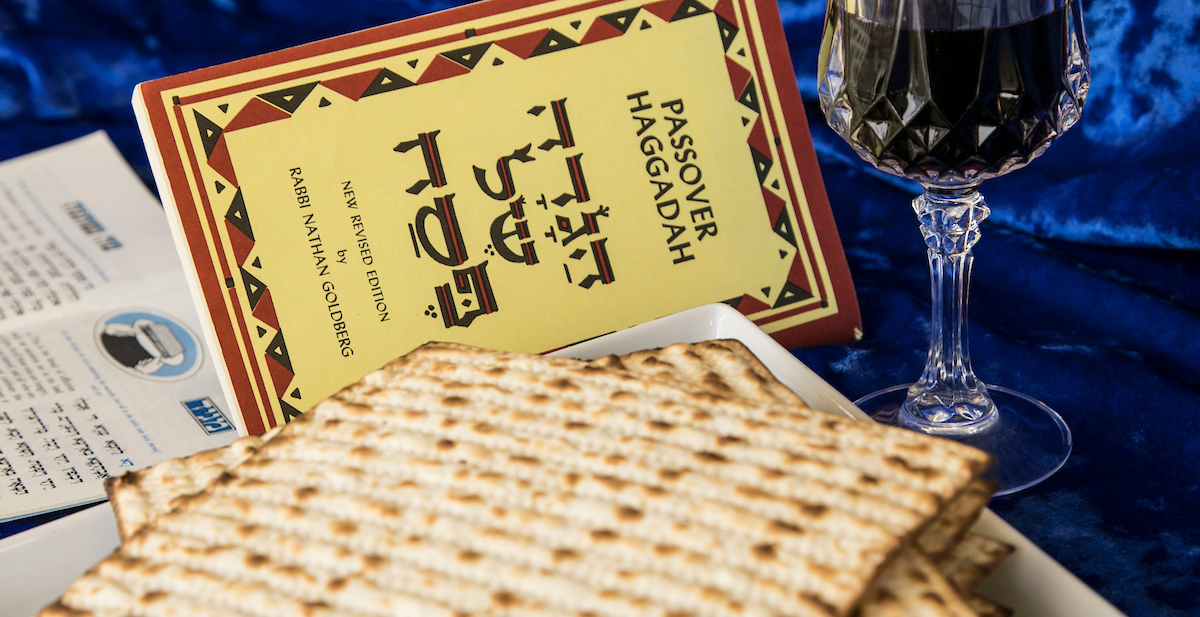 The Haggadah, or telling of the story of how the ancient Hebrews fled Egypt, guides participants during a Passover Seder. Matzah, or unleavened bread, is an integral part of the traditional storytelling. (DePaul University/Jamie Moncrief)
The Haggadah, or telling of the story of how the ancient Hebrews fled Egypt, guides participants during a Passover Seder. Matzah, or unleavened bread, is an integral part of the traditional storytelling. (DePaul University/Jamie Moncrief)
Members of the DePaul community - from all religious backgrounds - are invited to experience an interfaith Passover Seder on April 5, co-hosted by Jewish Life, Catholic Campus Ministry and the Office of Religious Diversity.
"This will not be your grandmother's Seder," says Matthew Charnay, coordinator for DePaul Jewish Life. "Student leaders from DePaul Jewish life will bring some of their favorite memories and family traditions to our own Seder. We will have members from the Catholic community and other religious organizations sharing their own thoughts and questions about the holiday."
Passover, which is celebrated this year from sundown on March 30 through April 7, is the Jewish holiday that commemorates the deliverance of the ancient Hebrews from slavery in Egypt. Many rituals and traditions are associated with Passover, including the Seder, a festive meal with specific foods, storytelling and songs, which is held on the first night and often the second night as well.
"Everyone usually goes home for Seder," explains Charnay. "But, we're breaking with tradition and holding our interfaith Seder on the seventh night of Passover when students, faculty and staff are on campus. We will sit around the table to tell this story of exodus from Egypt. Yet, it is more than a telling or a remembering of what our ancestors went through. It is also a reliving; to imagine ourselves as if we were living it."
Matzah, or unleavened bread, is integral to the Seder. During the meal questions are asked to help with the telling of the story. Among the questions asked: Why is this night different from all other nights? Why on any night do we eat leavened bread or matzah, but on this night we eat only matzah?
Charnay says the question is a reminder that when the Jews hastily fled Egypt there wasn't enough time for the bread to rise. Other traditional Passover food will be part of the Seder experience including brisket and charoset, a mixture of apples, honey and wine.
This year, the first and second nights of Passover coincide with Good Friday and Holy Saturday in Christianity.
"But Passover is not a Jewish Easter," Charnay quickly notes. "Both holidays often fall in the spring, and there is food and ritual, but they are celebrated for very different reasons. Come to the Seder and learn why they are not the same."
"The interfaith Passover Seder is an educational opportunity for Catholic students to learn about the Jewish roots of their Christian practice and gain insight into the current religious practice of their Jewish peers," says Amanda Thompson, the director of Catholic Campus Ministry. "People of other faiths and none can also participate and learn about the rich heritage of the Jewish people. It is an exciting opportunity for interfaith and interreligious dialogue."
"Passover is about sharing the memories and connecting with one another. Through stories, food and fun, the DePaul community hopes to learn and grow together in this season of festivities and holidays," says Charnay.
The interfaith Passover Seder will be held Thursday, April 5 from 6-8 p.m. in the Student Center, Room 314A, on the Lincoln Park Campus. For more information, contact Matthew Charnay.